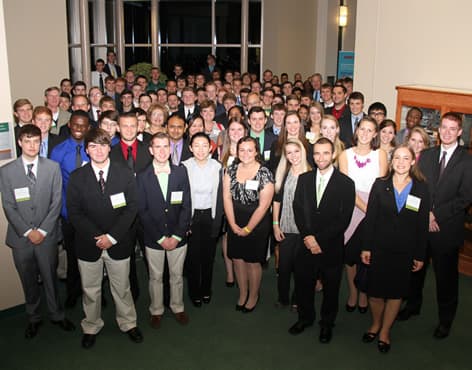Lee College of Engineering celebrates its legacy

Almost 50 years in the making, the William States Lee College of Engineering has a rich history of educating engineers and technologists who have made significant contributions to their professions and communities.
And the impacts of these contributions are the college’s legacy and the focus of a recent celebration – the Engineering Legacy Banquet.
“The purpose of the event was to honor the many contributions of our students, faculty and industry partners,” said Stamie Despo, alumni and external relations coordinator for Lee College of Engineering “At the same time we wanted to expose this legacy to our current students, as we prepare them to be tomorrow’s leaders.”
Lee College Dean Bob Johnson quoted the college’s namesake Bill Lee, who encouraged leaders to “Keep your commitment to excellence for continuous improvement… Seek to continually improve, plan it, do it, measure it, change it and repeat the cycle. Ethical leadership and ethical behavior have always been important, and now more than ever we need to elevate the visibility and awareness of the importance of ethics. This is of course, increasingly driven by the pace of change in our nation, but also the ever-faster pace of change in other nations, many with traditions and mores different from ours. So, as we engage worldwide, we must be acutely conscious of our values.
“Twenty years later, these words still describe the overarching culture of our college, with its strength in applied engineering, commitment to ethics and collaboration across the Carolinas and beyond,” said Johnson.
Igor Jablokov (’00, MBA), an entrepreneur-in-residence for Blackstone NC, a regional initiative focused on commercializing university-based research, served as the keynote speaker for the banquet. He also serves on the boards of the Council of Entrepreneurial Development, Innovate + Educate, Queen City Forward and Veterans for Ventures.
He spoke about the interplay between engineering and entrepreneurship. “It is great to see tonight the diversity of thought here, which is the cradle of innovation. The skills you are learning here will be valuable to society in the future.”
In many cases it can take years and even decades for ideas that are being proposed now to be developed and implemented, Jablokov said. And the development of an idea can involve numerous technologies and industries.
“When this college is educating engineers, it is not just producing people to go to work in an office, close the door and shut out the rest of the world,” he said. “It is educating the next generation of leaders in our industries and communities.”